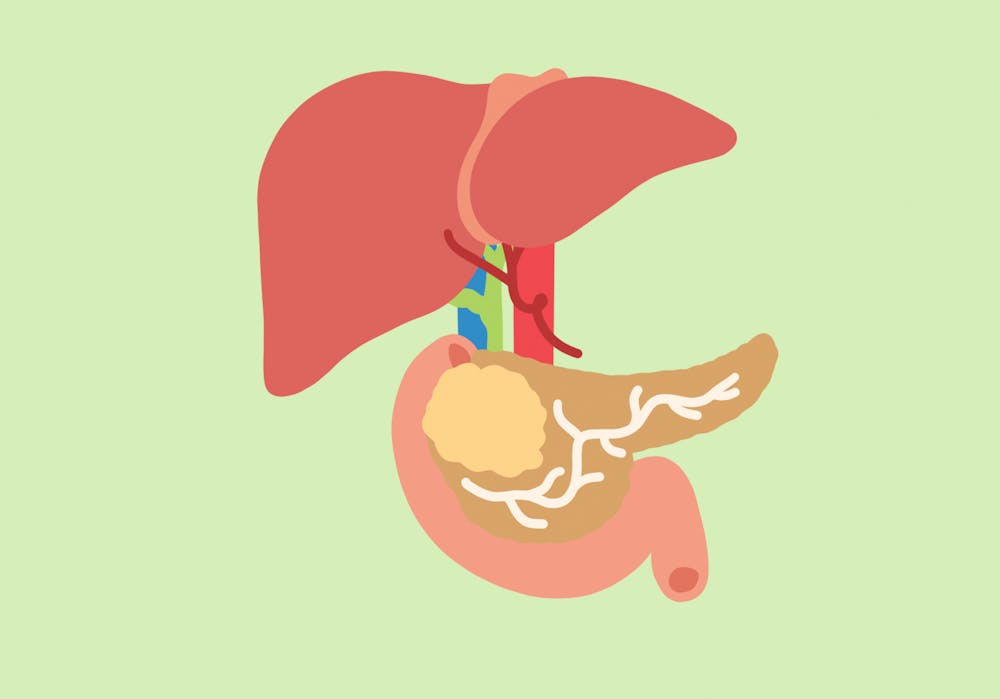Biomedical Engineering Prof. Kimberly Kelly — founder of ZielBio, an innovative biotechnology company — and her team have pioneered a new antibody therapy for pancreatic cancer that is now in a phase 1A dose escalation safety trial — a clinical trial that slowly increases the dose given to patients to determine proper dosing requirements.
The novel therapy hinges on the discovery that certain cancer cells, including certain pancreatic cancer cells, display a protein called plectin on the surface, while normal, healthy cells retain plectin cytoplasmically — or in the fluid inside the cell — Kelly said. It is not yet known exactly how this phenomenon occurs. However, Kelly and her team capitalized on the protein display for its therapeutic advancements, developing an antibody known as ZB131 that will bind to the cancerous cell’s surface by targeting plectin to arrest growth and even cause cell death.
“[Antibody therapy is] a pathway that we know how to manufacture that the FDA understands, limiting the toxicity to the patient while directly binding to the target,” Kelly said.
Samantha Perez, previously a doctoral candidate under Kelly in the department of biomedical engineering who now works at ZielBio, corroborated the importance of antibody utilization in the fight against pancreatic cancer.
“This is a great way of being able to target cancer cells without impacting normal cells,” Perez said.
Given the drug’s success in the lab and animal trials, it has now entered phase 1A dose escalation trials.
“The phase one trials are really a roller coaster,” Kelly said. “Your drug is [in patients, and] you really have to wait for all of the scans and all of the data to come back in.”
Perez learned that the first dose of the drug had been administered just months after she defended her dissertation concerning the evaluation of plectin-specific cancer therapies.
“[Starting clinical trials] was super exciting … it’s been my dream,” Perez said. “It was kind of like seeing the combination of serendipity.”
The goal of this trial is to both ensure the drug is safe to administer in humans and also evaluate the safety of different dose amounts. Dr. Ramesh Ramanathan, vice president for clinical development at ZielBio, explained the importance of the phase one trials.
“We test increasingly larger doses of the drug in groups of three patients each,” Ramanathan said. “Sometimes you will see [the drug] benefiting patients at this stage, but here we are really looking at increasing the dose of the drug."”
Currently, the drug is being administered weekly at 3 mg/kg, per the National Institutes of Health clinical trials database. This initial dose is devised through precise calculation and conversation based on previous pharmacology and animal trial data. Kelly and Ramanathan explained that complete tumor regression has occurred in animal trials. However, since the phase one trials have just begun, there are no conclusions based on human data.
“"We are seeing in animal studies that the drug shrinks tumors, sometimes even makes it close to complete shrinkage, in multiple different animal models which is very encouraging,” Ramanathan said. “Not many antibodies show that.”
Ramanathan hopes that a drug like ZB131 will be another strong contributor to the growing class of experimental antibody drugs hoping to revolutionize pancreatic cancer treatment.
“I think we have moved from the traditional cytotoxic chemotherapeutic drugs that you hear about, that have been used since the 1980s … to immunotherapy, and now antibody therapy as a new technology, and I think it’s showing a lot of promise,” Ramanathan said.
Kelly’s work seeks to upend the chemotherapeutic standard of care — which employs cytotoxic drugs that target rapidly-dividing cancer cells but also cause collateral damage to healthy cells in the process — and translate work at the lab bench into positive outcomes for patients — specifically those historically underserved by cutting-edge technologies.
“Some of those standard-of-care chemotherapies are just awful,” Kelly said. “There are so many side effects … it’s my hope for my drug and all other new drugs that they not only prolong life … but also give patients a much better quality of life.”
Correction: A previous version of this article stated that Samantha Perez worked at Zielbio as a doctoral candidate. Perez did not officially begin work at Zielbio until after defending her dissertation, and the article has been updated to reflect this information.






